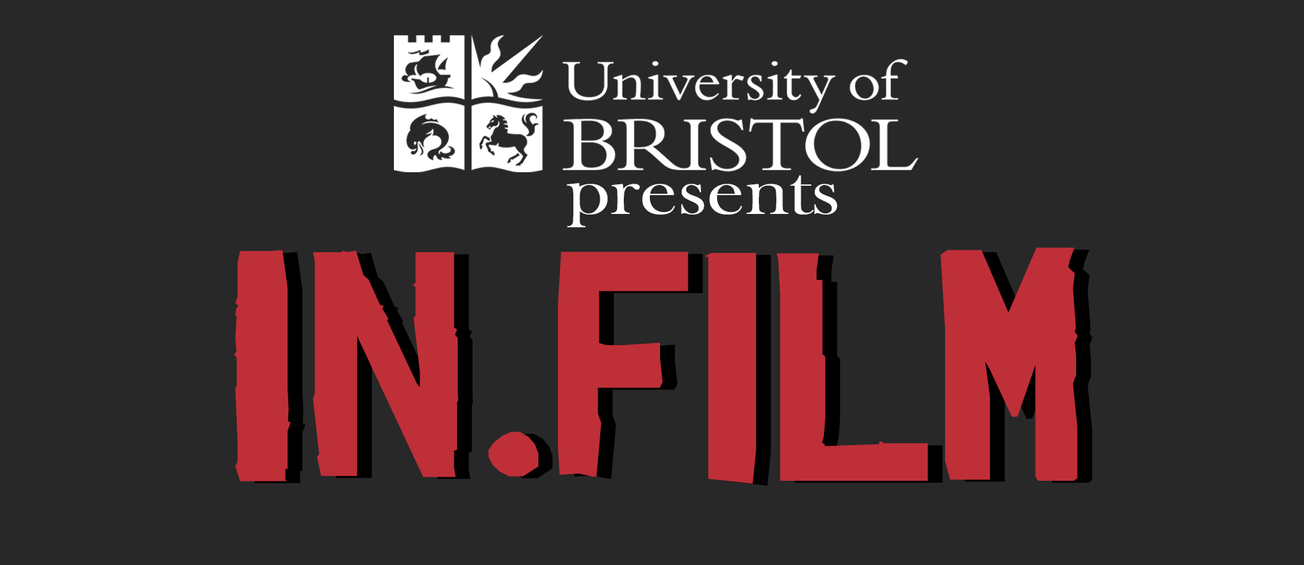Leah Martindale reviews the In.Film society’s showcase on the 6th June, which presented the past year of their student produced short films and television, as well as hosting Q&A sessions with two media professionals.
For In.Film society’s first large scale event at Cafe Kino, I arrived early in anticipation of a full afternoon of original student media. Despite the late start, contradictory to their stern warning about latecomers on the Facebook page, the event ran militarily to schedule and the basement space was eventually heaving with patrons in awe of the work produced throughout the year.
The event opened with a short and sweet word of thanks from the 2018-19 president Alex Troman, before the new In.Film committee introduced themselves via a short, pre-recorded video. The clip is self-explanatory, introducing the members in a jovial sense with their roles and a few fun facts about them. Already, the society are working hard to be an inviting group, as well as productive.
The first of four short films screened was Kyle Borg’s directorial debut The Witness, about a man (Joe Wells) who accidentally observes a brutal murder during a moment of introspection in a multi-storey car park. It is maturely paced and interestingly shot, with striking angles and frames. Unfortunately, as with most student films, the sound is traitorous of the film’s student backgrounds: not only with quality, but also discrepancies such as the audible clacking of rubber soled shoes. Overall, though, it is an enjoyable piece that leaves you wanting more.
The second screening was again a debut piece, Becky Orton’s Inevitable. It follows a young woman, Maude Sieghart in her first of three roles at Filmstock, as she is followed home by a man. He attacks her and dies after she retaliates – or does he? The role of the mysterious killer from The Witness is reprised here, a satisfying moment of continuation and recognition for the audience.
It is an enjoyable piece that leaves you wanting more
Although the tension is somewhat undercut by heavy-handed, stereotypical horror sound effects and more dodgy sound editing, Clement Jochem’s writing is measured and delicate, leading us down a windy road. Orton’s direction is somewhat undersold by technical wanting, but her vision is still achieved well. Unfortunately, the screening was disrupted by late guests loudly entering the basement space. Call me old fashioned, but I believe theatre rules must apply in a setting like this: late arrivals should only be let in during an interlude, not willy-nilly.
The third screening was You’re Mine, a thriller with unrealised potential. With stilted dialogue, and therefore static acting, it is the most amateur of the pieces. That being said, the use of light, colour, and contrast is visually captivating nonetheless. Although the plot and writing left something to be desired, director Troman intercut with intelligent shots which showcase some of Bristol’s beauty, such as Harbourside and College Green, from unseen perspectives.

(Facebook / In. Film Bristol)
Train of Thought was a personal favourite and the final short film shown. While, as with many, the sound exposes its low budget, Louis Fleury’s complex plot inspires introspection into friendship, memory, and grief, with a gentle touch so rare in student cinema. Although some scenes of flashback dialogue are somewhat contrived, Jochem’s colour palette, the use of orange and blue tones, is key to a thoroughly enjoyable short.
After a short interlude, the Q&A sessions began with Alice Cabanas, a BFI and Watershed New Talent Exec, then Charlie Perkins, development producer of internet phenomenon Don’t Hug Me I’m Scared. The Q&As, however short, were insightful into the lives and work of these women, and therefore invaluable to students with their own aspirations in industry. With inclusivity cropping up in the first talk, it was apt to reflect on the diversity of the In.Film society production base and the speakers themselves.
The overarching advice for young creatives was that collaboration is key, and to make connections with like-minded, but differently talented, artists.
Both Alice and Charlie were personable and proffered their advice without a hint of condescension. The overarching advice for young creatives was that collaboration is key, and to make connections with like-minded, but differently talented, artists. Cabanas discussed many artists’ networks she recommends exploring, and Perkins previewed an episode of new project Jarressey, made in collaboration with Don’t Hug Me alumni, an equally bizarre, surreal ‘five minutes in hell’ (Perkins’ own words). With a clear oversaturation of genre thrillers in In.Film’s portfolio thus far, Perkins’ passion and success with the weird and wonderful may inspire the filmmakers to branch out and let their imaginations truly run amok.
The event ended with a screening of two episodes of Miles Jackson’s brainchild Long Haul, a five episode series following the experiences of a group of flatmates after one dies. Each episode focuses on a stage of grief, and the two shown were Denial and Depression. In Jackson’s absence, producer Isaac Sneade introduced the series with a heartfelt oration on its personal importance to him. It was then more than ever that the community spirit of In.Film was most felt. It is clearly a society where passions are ignited and creativity has full reign.
The first episode still requires more editing, with bits of sound missing, and the low quality projector unfortunately ruined one of the more gut-wrenching moments. Sieghart plays the lead in Denial with devastating passion – her expressions are intuitive, her vocalisation captivating. Anna Fenton Garvey plays off of her unwaveringly. Jochem’s reproduction of the intoxicated haze is shockingly accurate, and Jackson’s personification of grief separates him from the humdrum of Skins-wannabe, party culture writers. The episode is reminiscent in tone and production of Channel 4’s Glue.
However, the day ended on its best foot with Depression. Seye Akinsan is magnificent in the role of Charlie, as his regulated life falls apart around him, with each scene a recognisable gut punch to anyone who has battled with their mental health. Miles Jackson and Sam Anghelides’ cinematography is the lovechild of Submarine (2010) and What’s Eating Gilbert Grape (1993). Although the monochrome editing could be easily dismissed as pretentious, it is in fact a measured and painstaking portrayal of the colourless world that is depression - any such criticism would be laughable.
Miles Jackson and Sam Anghelides’ cinematography is the lovechild of Submarine (2010) and What’s Eating Gilbert Grape (1993)
Depression provokes pointed and devastating introspection, so professional I would not think twice if shown at a film festival, or as a PSA for depression itself. Jackson and Sneade should be immensely proud of the series, which is mature beyond their age and tells its tale with the utmost respect.
In.Film’s independence throughout the process was the standout aspect of the event. Their films are shot on borrowed equipment, fundraised by the committee from minimal sources. The products are only possible due to the passion, dedication, and perseverance of the society and their members. In time, the resurrection of In.Film could be as notable as Charlie Perkins’ own revitalisation of the Revunions. This group is certainly one to watch.
Featured Image: Facebook / In. Film Bristol
By Leah Martindale







